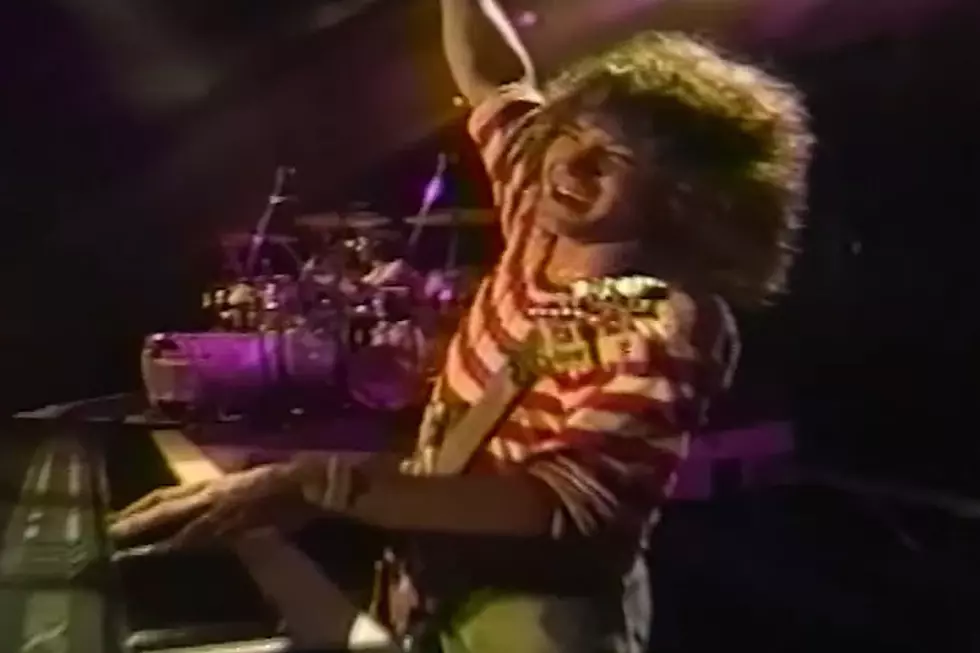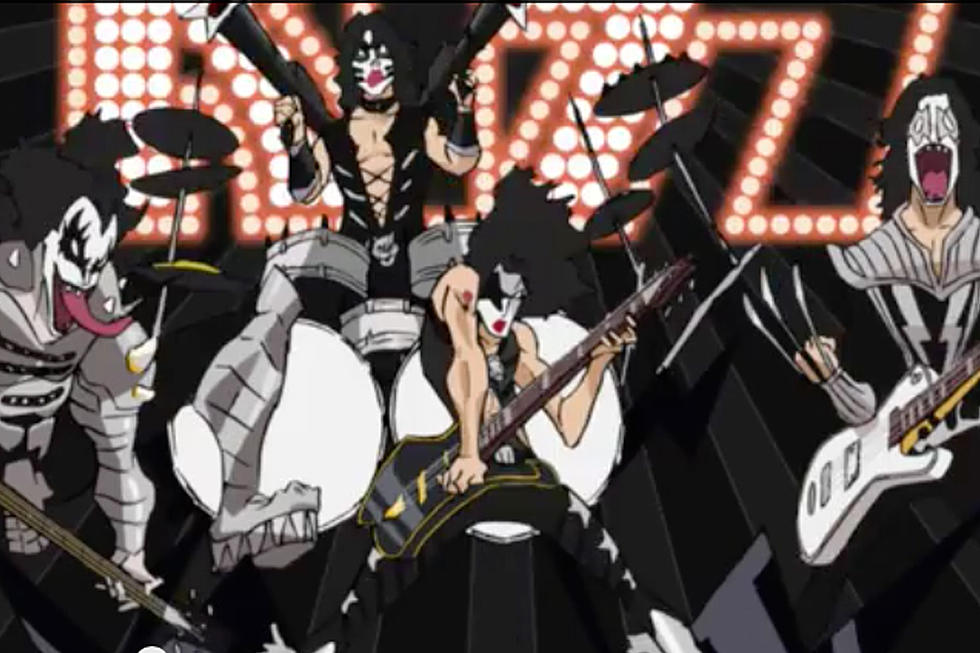
The History of Eddie Van Halen and Keyboards
Even the great ones get things wrong sometimes. That was the case in 1982 when Van Halen singer David Lee Roth and superstar producer Ted Templeman turned up their nose at a catchy keyboard-driven song penned by Eddie Van Halen. Bassist Michael Anthony and drummer Alex Van Halen subsequently offered a similarly lukewarm reaction.
“You’re a guitar hero,” Eddie heard from the others. “Don’t stretch yourself too thin. Don’t start playing other instruments.” The song in question? ‘Jump,’ a composition that would spend a month at the top of the Billboard singles chart in 1984, and go on to become the band’s most recognizable hit.
It’s telling that Eddie ultimately refused to back down when it came to ‘Jump.’ Indeed, one of the great ironies of Eddie Van Halen’s musical career is that keyboards, perhaps more than guitar, served as a means for his most memorable musical rebellions. Fully understanding that dynamic begins with a look at Van Halen’s childhood.
As is well known, the Dutch-born Eddie and Alex Van Halen grew up in musical family. Their father Jan, who was a jazz musician, started them on piano by the time the boys were five years old. Those lessons continued after the Van Halen family emigrated from Holland to the United States in 1962. But from the perspective of Eddie and Alex’s parents, piano instruction didn’t represent an attempt to make sure that their children were well-rounded young people. Instead, it was training for their future careers as concert pianists.
Making sure that their children achieved that degree of mastery required years of study and a special kind of teacher. “I played a long time,” Van Halen once told Guitar Player. “Got all my musical theory and stuff from playing piano. We used to have this old Russian teacher that was a super concert pianist.” This teacher served up some Old World discipline to make sure that the boys progressed. “[He] couldn’t speak a word of English,” Van Halen explained. “He would just sit there with a ruler ready to slap my face if I made a mistake.” These harsh methods, for better or worse, seemed to serve their purpose, as a young Eddie went on to win a number of piano competitions in greater Los Angeles.
By the mid-'60s, the Van Halen brothers had discovered rock music. Eddie took to guitar and his brother to drums, and neither wanted much to do with piano anymore. Eddie recounted his thought process during this time to Guitar Player: “I said, ‘F-- the piano! I don’t want to sit down. I want to stand up and be crazy!’” Soon after, Eddie and Alex suffered through their last piano lessons, and set out to be rock musicians.
Watch Van Halen Perform 'And the Cradle Will Rock'
Van Halen had achieved notable success as the '70s came to a close. The group had released two platinum records and had barnstormed the globe in support of both. For Eddie Van Halen, however, the accolades further mounted, since he’d established himself as one of the most admired and innovative guitarists in the world. Polls held by Guitar Player told the tale, with Eddie winning the Best New Talent award in late 1978 and Best Rock Guitarist in 1979. He was unquestionably a guitar hero.
This status, Eddie soon learned, made his producer and bandmates uncomfortable with his interest in incorporating keyboards into Van Halen’s sound. During studio session for the band’s third album, ‘Women and Children First,’ Van Halen surprised Templeman by playing a Wurlitzer electric piano through a Marshall stack while the band tracked the anthemic ‘And the Cradle Will Rock ... ’ Eddie later explained to one interviewer that fans “might not even notice” the keyboard on the finished track, because “it sounds like my guitar.” In other words, the band and Templeman let Van Halen add piano to the song precisely because it didn’t sound like piano.
In case Eddie hadn’t gotten the memo, the band -- particularly Roth -- made it clear that they didn’t want their guitarist tinkling the ivories when Van Halen hit the road in 1980. In discussing ‘Cradle,’ Eddie noted, “That was my first encounter with the band not wanting me to play keyboards -- when we did the song live, Mike played it. They didn't want a ‘guitar hero’ playing keyboards, and that kind of ties in with why they didn’t want ‘Jump.’”
These battles over creativity, keyboards, and Eddie's status as a guitar hero continued into the 1980s. The guitarist penned some songs from 1981’s ‘Fair Warning,’ like “Hear About It Later,” on piano, even though he’d play them on guitar on the album. He did, however, sell the band and Templeman on an evil-sounding instrumental called ‘Sunday Afternoon in the Park,’ which saw Van Halen utilize an Electro-Harmonix Micro-Synthesizer for the track.
The sessions for 1982's ‘Diver Down’ helped bring this long-simmering conflict to a head. Eddie had come up with a cool new riff on a Minimoog synthesizer and shared it with Templeman and Roth. Soon after, the pair hijacked Eddie’s synth composition for “Dancing in the Streets,” a cover song that Van Halen disliked. In the end, Van Halen told Guitar World, “Ted and Dave were happy -- and I wasn’t.”
Listen to Van Halen Perform 'Dreams'
By late 1983, Eddie had built his own home studio, 5150, which allowed him and engineer Donn Landee to record synth-heavy songs that in the past the band and Templeman might have scotched before work had even begun on them. As a result, the ‘1984’ sessions produced not one but three separate keyboard-heavy tunes: the instrumental ‘1984,’ ‘Jump’ and ‘I’ll Wait,’ a bouncy, synth-driven number that peaked at No. 13 on the Billboard chart. And during the ‘1984’ tour, Van Halen further embraced his new role as a multi-instrumentalist by playing keyboards onstage during those three tracks. Eddie, after years of struggle, had won his war against those who wanted him to refrain from playing keyboards in his band.
Roth and Templeman had both exited the Van Halen camp by 1985, with new singer Sammy Hagar and producer Mick Jones entering the fold. These personnel changes encouraged Eddie to continue to write keyboard-based material for inclusion on the band’s seventh and highest-charting album, ‘5150.’ Three hits from it, ‘Why Can’t This Be Love,’ ‘Dreams’ and ‘Love Walks In,’ all prominently featured Eddie’s keyboard playing, offering up the best evidence yet that going forward keyboards would get an equal billing with guitars on Van Halen records. On the band’s massively successful ‘5150’ tour, Eddie once again split his time by playing both keys and guitar during live performances.
During the years that followed, the band produced three more hit albums with Hagar: ‘OU812’ (1988), ‘For Unlawful Carnal Knowledge’ (1991) and ‘Balance’ (1995). Eddie played keyboards on all of them, but in a new twist, largely stopped playing keyboards onstage. In 1988, for instance, Van Halen played the fast-paced rocker ‘Mine All Mine’ against a sequenced keyboard backing track. By the early '90s, the band had hired longtime Montrose / Night Ranger keyboardist Alan Fitzgerald to play offstage during the band’s concerts up through 2004, a fact that they’d keep low-key in the press.
Despite all of the accolades and success that Eddie Van Halen’s synth playing brought to Van Halen, perhaps the band’s most memorable onstage keyboard performance came during a 2007 concert in Greensboro, N.C. After a tech accidentally played the wrong synth backing track for ‘Jump,’ chaos (and much embarrassment) ensued as Eddie fruitlessly attempted to get his guitar in tune with the song’s keyboard lines. Nevertheless, the experience apparently did little to encourage Eddie to play keyboards live again -- a decision that has, interestingly enough, once again allowed Eddie Van Halen to represent himself in concert as a guitar hero rather than multi-instrumentalist.
You Think You Know Van Halen?
See Yearbook Photos of Eddie Van Halen and Other Rockers
More From KOOL 101.7
![Rayman’s Song of the Day-Rock and Roll All Nite by Kiss [VIDEO]](http://townsquare.media/site/163/files/2015/01/162832256.jpg?w=980&q=75)









